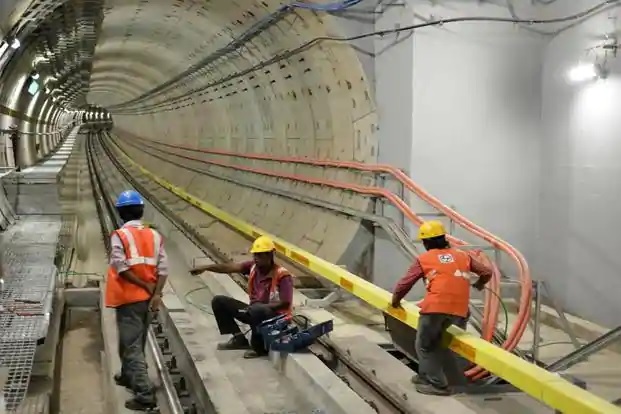The cost of the underground Mumbai Metro 3 project has escalated by over Rs 10,000 crore to Rs 33,406 crore from the original estimate of Rs 23,136 crore in 2016. When tenders were invited in 2016, the cost was based on the 2011 estimate.
The escalation proposal was submitted to the state finance department by the Mumbai Metro Rail Corporation (MMRC), which is implementing the 33.5km rail link between Cuffe Parade and Seepz, in February. The finance department is yet to clear it. “There is a perception that no further cost should be approved till the controversy over the location of the car shed is resolved,” a government source said.
It is also learnt that the Japan International Cooperation Agency (JICA), which is funding almost 60% of the total project cost, has not released funds for Metro 3 for the past year. “It is not JICA’s fault. The agency is waiting for the cost escalation approvals by the state and Centre,” a source said.
Even as the project cost has shot up, there is growing uneasiness within government circles at the inability of the ruling MVA to shift the metro car shed from Aarey to Kanjurmarg.
Last December, the Bombay high court stayed the suburban collector’s decision to hand over the Kanjurmarg land for the car shed. “Since then, there has been virtually no initiative on the part of state agencies to vacate the stay,” a source said.
The high court had fixed the matter for final hearing in February, but the state sought time to file replies and the case was adjourned to March. “Between March and April 2021, the case came up five times in the HC. But each time the matter came up, the state constantly sought more time,” an official said.
On February 2, the Mumbai Metropolitan Region Development Authority (MMRDA), too, filed an application seeking that the stay order be vacated as a “public project was being gravely affected”.
“After filing the application, the MMRDA has done little to push the case in the court for an early hearing,” an official said.
A senior bureaucrat ascribed the cost escalation to various reasons, the controversy over the car shed being one of them.
“The original project cost was based on the terrain of the Delhi metro. It was later found that Mumbai has a different terrain,” he said.
The land acquisition cost for Metro 3 also drastically increased once the project commenced. The original estimate for land acquisition was fixed at Rs 590 crore, which has now increased to Rs 1,483 crore.
The largest cost escalation component is for construction of the tunnel, stations and car depot. It was initially pegged at Rs 10,708 crore, but the revised cost estimate is Rs 18,711 crore.
Early this year, a nine-member government panel headed by the then chief secretary Sanjay Kumar said an integrated metro depot at Kanjurmarg will save the government Rs 1,580 crore against land and construction costs. The committee appointed by the state government said the Metro 3 car shed at Aarey can accommodate only 30 rakes, while the Kanjurmarg one is large enough to hold 55.
The panel report also concluded that the 41-hectare Kanjurmarg plot is big enough to be an integrated depot for three Metro lines: 3, 4 and 6.
The 20-page report mentions that “if the integrated depot is planned at Kanjurmarg, an interchange station of Line 14 and Line 6 can be proposed at Kanjurmarg, facilitating better interchange between Lines 3, 6 and 14”.
The Shiv Sena-led alliance government also has to cope with another obstacle on the Kanjurmarg land. Construction giant Shapoorji Pallonji has invested Rs 471 crore on the 500-acre Kanjurmarg sprawl with the Garodia family, which has claimed ownership over the plot.





